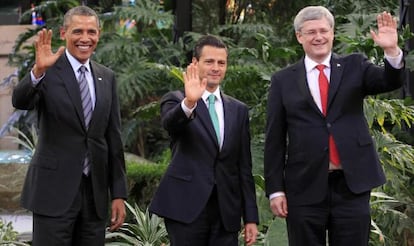North American leaders agree to work toward easing visa restrictions for transport
Gripes over spying, oil pipeline and migration were aired between three NAFTA states


The leaders of Mexico, United States and Canada on Wednesday agreed to speed up the lifting of transportation, security and energy barriers in an effort to make the entire North American continent more competitive with Asian nations and other blocs.
Mexico’s Enrique Peña Nieto, President Barack Obama and Canadian Prime Minister Stephen Harper discussed ways to revitalize the 20-year-old North American Free Trade Agreement (NAFTA) at a summit held in the resort Mexican city of Toluca, some 60 kilometers from Mexico City.
The three pledged to make North America “the most competitive region in the world.”
This was the seventh North American Leaders Summit held, but on this occasion bilateral tensions between the partners led to a chilly climate at some of the meetings. Mexico welcomed Obama with veiled complaints concerning his silence over allegations last year about spying activities carried out by the US National Security Agency (NSA) against Peña Nieto and his predecessor as president, Felipe Calderón. Mention was also made about reported human rights abuses by US officers on Mexican migrants at the border, and the problems facing inmates serving time in US jails.
But Mexican officials issued their complaints in low-profile discussions with their US counterparts to avoid torpedoing an ongoing debate by lawmakers on Capitol Hill over Obama’s immigration reform proposals, which face an uphill battle getting through Congress. Mexicans make up the majority of the estimated 11 million undocumented workers in the United States. Under the reform, Obama wants to bring them out of the shadows so that they can begin paying taxes and Social Security contributions, but he had met much resistance from hardline Republican conservatives.
On the other hand, the suspicions in Washington have centered on Peña Nieto’s decision to scale back joint law-enforcement security operations with the United States, which had been strengthened under Calderón. Specifically, the CIA, FBI and DEA can no longer conduct operations on Mexican territory as freely as in the past.
Amid the tense background, “los tres amigos” pledged to work to modernize NAFTA – worth $1 trillion a year
Harper, Canada’s conservative prime minister who arrived one day early to meet with Peña Nieto, was also bombarded with complaints by the Mexican government for his country’s decision in 2009 to require visas for all Mexicans. Ottawa imposed the requirement to curb the number of asylum seekers, whose numbers had been soaring in recent years.
The Canadian prime minister has his own gripe with Obama for his delay in making a decision about the controversial Keystone XL pipeline project, which would carry crude oil from Canada's tar sands in Alberta across the continental United States to Texas.
Amid the tense background, “los tres amigos” pledged to work to modernize NAFTA – which is worth $1 trillion a year (700,000 billion euros) – under the terms of the 12-nation Trans-Pacific Partnership (TPP) project that Washington hopes to complete this year.
Nonetheless, there are still travel barriers in place, such as the requirement of Mexican truck drivers to obtain visas before they can transport goods to the United States. The US administration has pledged to broaden the existing programs, such as Global Entry and Nexus, which allow expedited clearance for low-risk travelers. This proposal could face heavy opposition by Republicans in Congress who want tighter immigration laws.
The plan to improve competition focuses on the creation of synergies with other nations and blocs, primarily with the European Union and the TPP member countries.
In the last few weeks, US Secretary of State John Kerry and Commerce Secretary Penny Pritzker have stressed the need to push the TPP project as a way of reactivating NAFTA without having to reopen talks on the trilateral trade pact. “The TPP is a very critical component of sort of moving to the next tier, post-NAFTA; so I don’t think you have to open up NAFTA, per se, in order to achieve what we’re trying to achieve,” Kerry said earlier this month. There has been reluctance by many in Obama’s Democratic Party to open discussions on TPP during the middle of a mid-term election campaign, but the US president himself felt comfortable about discussing the partnership’s future in Toluca on Wednesday.
The three leaders also agreed on protecting the region's Monarch butterfly, which migrates from Canada to Mexico every year but whose population has fallen, and continuing cooperation on security.
Tu suscripción se está usando en otro dispositivo
¿Quieres añadir otro usuario a tu suscripción?
Si continúas leyendo en este dispositivo, no se podrá leer en el otro.
FlechaTu suscripción se está usando en otro dispositivo y solo puedes acceder a EL PAÍS desde un dispositivo a la vez.
Si quieres compartir tu cuenta, cambia tu suscripción a la modalidad Premium, así podrás añadir otro usuario. Cada uno accederá con su propia cuenta de email, lo que os permitirá personalizar vuestra experiencia en EL PAÍS.
¿Tienes una suscripción de empresa? Accede aquí para contratar más cuentas.
En el caso de no saber quién está usando tu cuenta, te recomendamos cambiar tu contraseña aquí.
Si decides continuar compartiendo tu cuenta, este mensaje se mostrará en tu dispositivo y en el de la otra persona que está usando tu cuenta de forma indefinida, afectando a tu experiencia de lectura. Puedes consultar aquí los términos y condiciones de la suscripción digital.








































